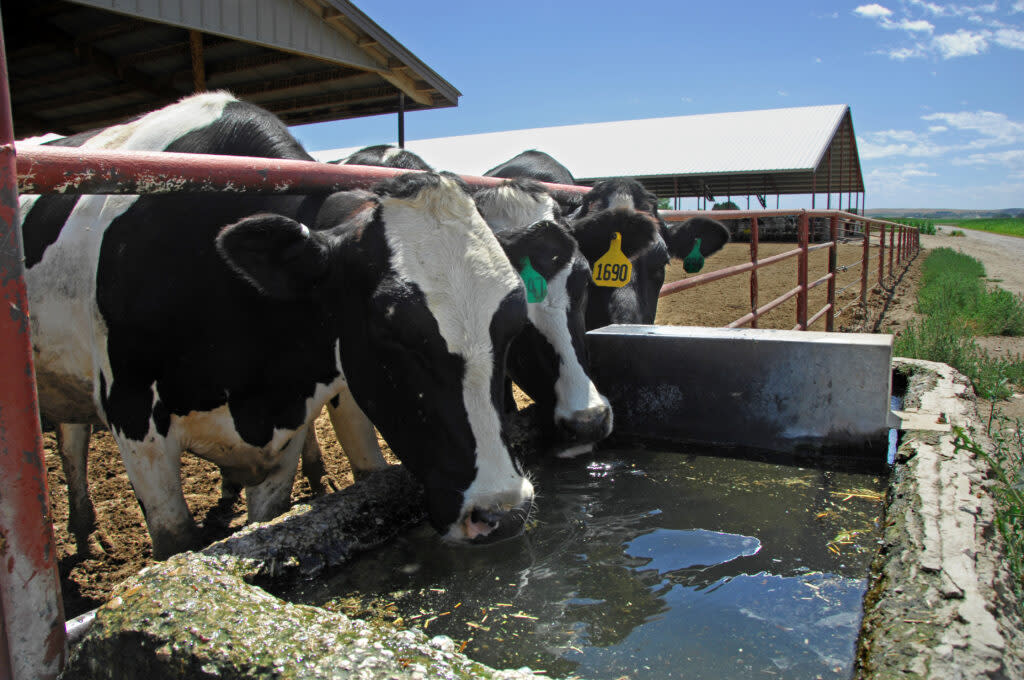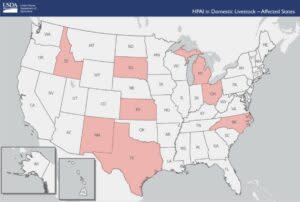State officials worry about financial impact after bird flu cases detected in Idaho cattle

On April 1, the Idaho State Department of Agriculture reported its first case of the bird flu in cattle in Cassia County. And on Monday, the department confirmed a second herd in Cassia County is positive for the bird flu. Pictured in this file photo are uninfected dairy cows drinking water from a trough in Fruitland, Idaho. (Kirsten Strough/U.S. Department of Agriculture)
Correction: This story has been corrected to reflect that the sick cattle in Cassia County were resident cattle in the Idaho facility, not the cattle imported from Texas.
As cases of highly pathogenic avian influenza spread across U.S. cattle, Idaho officials say their biggest concern is the virus’ impact on Idaho’s economy.
The illness, also coined the bird flu, has sickened cattle across at least eight states, with the first case detected in Texas cattle in late March, according to the U.S. Department of Agriculture.
On April 1, the Idaho State Department of Agriculture reported its first case of the bird flu in cattle in Cassia County. The facility had recently imported cattle from Texas, Sydney Kennedy, the spokesperson for the department of agriculture told the Idaho Capital Sun. The sick cattle, however, were resident cattle on the Cassia County facility.
And on Monday, the department confirmed a second herd in Cassia County is positive for the bird flu.
Kennedy said the state is well-prepared with financial resources and trained staff to respond to animal diseases. The Idaho facilities with infected cattle have been placed under a quarantine to limit the movement of cattle, she said.
The bird flu, or highly pathogenic avian influenza, has spread among cattle in eight states. (Screenshot of U.S. Department of Agriculture website)
“Idaho is a major livestock state, and we cannot forget about what this truly means to the dairymen,” she said. “The outbreak in dairy herds primarily affects lactating cows, reducing milk production, this leaves the greatest amount of financial impact on the dairymen. Idaho’s dairy industry contributes significant economic value ($3.5 billion) to our state.”
What is the highly pathogenic avian influenza — a.k.a. bird flu?
The bird flu spreads naturally among wild aquatic birds worldwide, and it can infect domestic poultry and other species, according to the Centers for Disease Control and Prevention.
Lauren Christensen is an assistant professor in mixed practice production medicine at the University of Idaho. (Courtesy of the University of Idaho)
While the virus emerged through birds, it has been detected in cattle, which is unusual, according to University of Idaho veterinary medicine assistant professor Lauren Christensen.
“This is not something that we’re typically looking for in mammals because the virus typically is only able to infect other poultry or other birds,” she told the Idaho Capital Sun. “We usually don’t see the virus able to switch over to mammals.”
The virus is mostly seen in wild flocks of geese or ducks that are migrating, Christensen said. Like with the flu, she said it’s virus particles coming from one infected animal or person going to another — usually in close contact.
Christensen said the virus causes significant disease and even death among chickens. But so far, no cows across the country have died from it.
Christensen said the main symptoms of the virus in cows include decrease in milk production and loss in appetite. Other symptoms may include a low grade fever, color changes in milk or thickened milk.
Pasteurized dairy products are safe, experts say
Christensen said milk bought at the grocery store is safe for human consumption because it’s been pasteurized, or heated to a high temperature to kill harmful bacteria.
“Wash your hands, drink pasteurized milk, and you’ll be fine,” Christensen said.
Rick Naerebout is the CEO of the Idaho Dairymen’s Association. (Courtesy of Rick Naerebout)
While the bird flu does not normally infect humans, some human infections have occurred, according to the CDC. Earlier this month, federal officials identified the first human case of the illness in a Texas dairy worker, Politico reported. The symptoms are mild and the worker is expected to recover.
Rick Naerebout, the CEO of the Idaho Dairymen’s Association, told the Sun the biggest concern for Idaho is its financial impact on the dairy industry.
Naerebout said Idaho dairy workers are encouraged to follow biosecurity measures such as wearing personal protective equipment such as gloves, aprons and glasses. Dairy workers are also encouraged to separate their work clothes and everyday clothes, he said.
“What we’re hearing coming out of the Southwest is you can lose up to 20% of your milk production, and our dairymen are coming off over a year of negative margin,” he said. “That’s just really stressful on the finances and trying to be able to continue to wander through the storm that we’re in.”
To learn more about detections of the virus, visit the U.S. Department of Agriculture website. For updates about detected reports in Idaho, visit the Idaho State Department of Agriculture website. To learn more about the virus and how to prevent it, visit the CDC website.
The department recommends dairy producers contact their local veterinarian immediately if their cattle are showing the following symptoms:
Drop in milk production
Loss of appetite
Changes in manure consistency
Thickened or colostrum-like milk
Low-grade fever
GET THE MORNING HEADLINES DELIVERED TO YOUR INBOX
The post State officials worry about financial impact after bird flu cases detected in Idaho cattle appeared first on Idaho Capital Sun.




